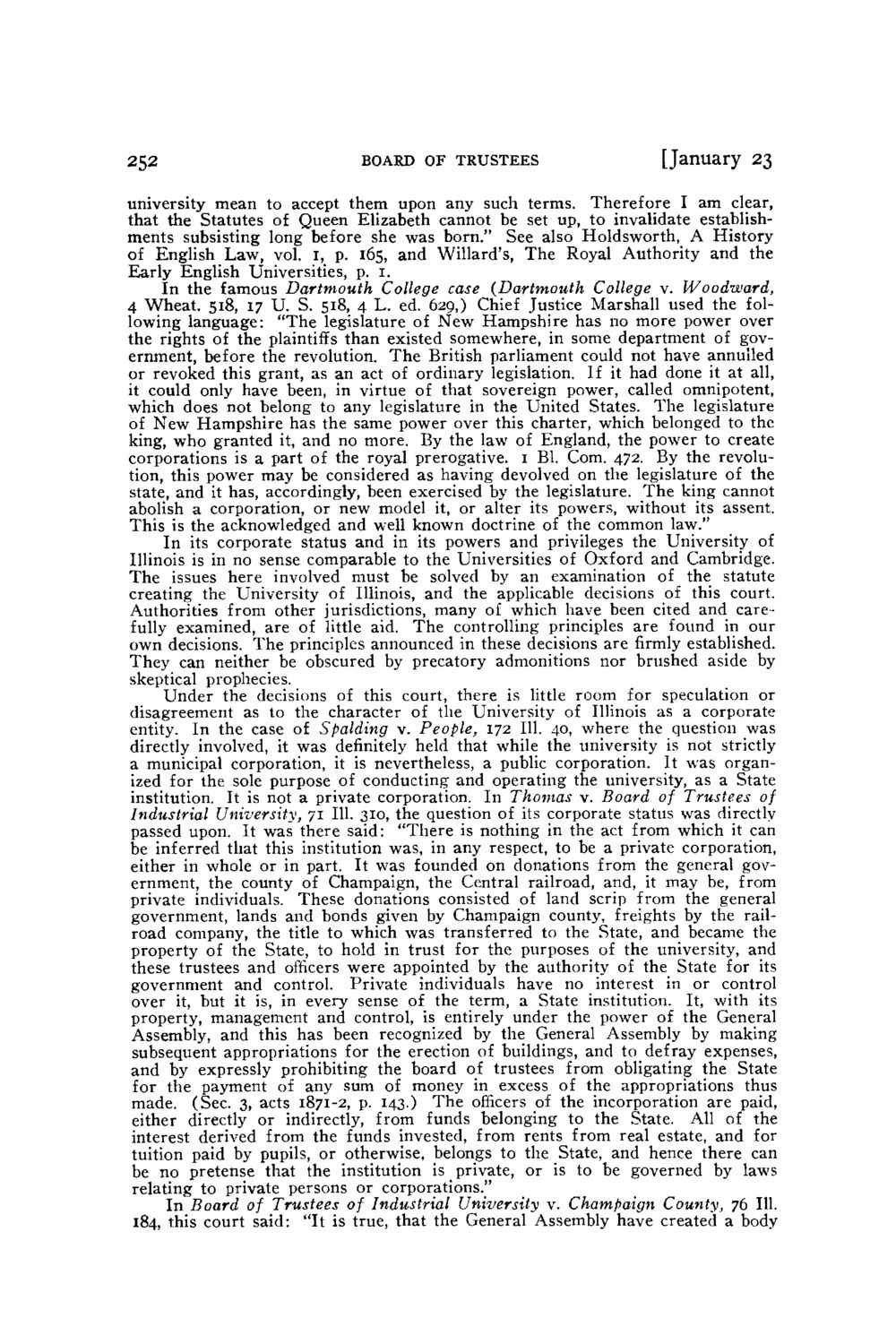| |
| |
Caption: Board of Trustees Minutes - 1944
This is a reduced-resolution page image for fast online browsing.

EXTRACTED TEXT FROM PAGE:
252 BOARD OF TRUSTEES [January 23 university mean to accept them upon any such terms. Therefore I am clear, that the Statutes of Queen Elizabeth cannot be set up, to invalidate establishments subsisting long before she was born." See also Holdsworth, A History of English Law, vol. I, p. 165, and Willard's, The Royal Authority and the Early English Universities, p. I. In the famous Dartmouth College case (Dartmouth College v. Woodward, 4 Wheat. 518, 17 U. S. 518, 4 L. ed. 629,) Chief Justice Marshall used the following language: "The legislature of New Hampshire has no more power over the rights of the plaintiffs than existed somewhere, in some department of government, before the revolution. T h e British parliament could not have annulled or revoked this grant, as an act of ordinary legislation. If it had done it at all, it could only have been, in virtue of that sovereign power, called omnipotent, which does not belong to any legislature in the United States. The legislature of New Hampshire has the same power over this charter, which belonged to the king, who granted it, and no more. By the law of England, the power to create corporations is a part of the royal prerogative. 1 Bl. Com. 472. By the revolution, this power may be considered as having devolved on the legislature of the state, and it has, accordingly, been exercised by the legislature. T h e king cannot abolish a corporation, or new model it, or alter its powers, without its assent. This is the acknowledged and well known doctrine of the common law." In its corporate status and in its powers and privileges the University of Illinois is in no sense comparable to the Universities of Oxford and Cambridge. The issues here involved must be solved by an examination of the statute creating the University of Illinois, and the applicable decisions of this court. Authorities from other jurisdictions, many of which have been cited and carefully examined, are of little aid. The controlling principles are found in our own decisions. The principles announced in these decisions are firmly established. They can neither be obscured by precatory admonitions nor brushed aside by skeptical prophecies. Under the decisions of this court, there is little room for speculation or disagreement as to the character of the University of Illinois as a corporate entity. In the case of Spalding v. People, 172 111. 40, where the question was directly involved, it was definitely held that while the university is not strictly a municipal corporation, it is nevertheless, a public corporation. It was organized for the sole purpose of conducting and operating the university, as a State institution. It is not a private corporation. In Thomas v. Board of Trustees of Industrial University, 71 111. 310, the question of its corporate status was directly passed upon. It was there said: "There is nothing in the act from which it can be inferred that this institution was, in any respect, to be a private corporation, either in whole or in part. It was founded on donations from the general government, the county of Champaign, the Central railroad, and, it may be, from private individuals. These donations consisted of land scrip from the general government, lands and bonds given by Champaign county, freights by the railroad company, the title to which was transferred to the State, and became the property of the State, to hold in trust for the purposes of the university, and these trustees and officers were appointed by the authority of the State for its government and control. Private individuals have no interest in or control over it, but it is, in every sense of the term, a State institution. It, with its property, management and control, is entirely under the power of the General Assembly, and this has been recognized by the General Assembly by making subsequent appropriations for the erection of buildings, and to defray expenses, and by expressly prohibiting the board of trustees from obligating the State for the payment of any sum of money in excess of the appropriations thus made. (Sec. 3, acts 1871-2, p. 143.) T h e officers of the incorporation are paid, either directly or indirectly, from funds belonging to the State. All of the interest derived from the funds invested, from rents from real estate, and for tuition paid by pupils, or otherwise, belongs to the State, and hence there can be no pretense that the institution is private, or is to be governed by laws relating to private persons or corporations." In Board of Trustees of Industrial University v. Champaign County, 76 111. 184, this court said: "It is true, that the General Assembly have created a body
| |